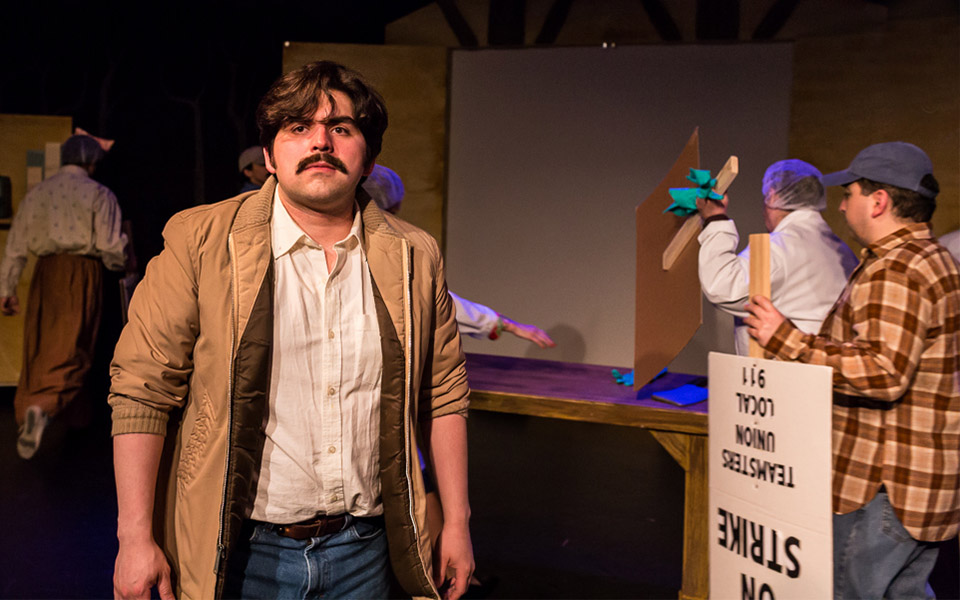Talking with actor Feliciano Tencos-Garcia
You are the newest member to the Milagro family. How did your involvement with us begin?
 Okay, so I give a lot of details, so forgive me if I ramble. I crashed and burned on my first outing with Milagro. Roy asked me to come in for a private table-reading of a play they were looking put on, and it was entirely in Spanish. I grew up around Spanish, speaking it, singing it, bragging about my cooking in Spanish, but I’m slow to read it because I never had a formal Spanish education. I asked Roy if I could get a copy in advance to prepare, but they had to keep the show under wraps and couldn’t send me a copy. I failed to inform him of my competency in Spanish, but I still showed up to see if I can read through script, and realized it was High Society, 17th Century, no-one-in-my-family-ever-spoke-like-this Spanish. It was brutal. Roy pulled me aside and said that he’d take over reading my part. I was incredibly grateful and embarrassed at the same time, because I felt like grade schooler all over again, who was scared of public speaking and just had their pants pulled down by the school bully in the middle of their speech about how they spent their summer vacation.
Okay, so I give a lot of details, so forgive me if I ramble. I crashed and burned on my first outing with Milagro. Roy asked me to come in for a private table-reading of a play they were looking put on, and it was entirely in Spanish. I grew up around Spanish, speaking it, singing it, bragging about my cooking in Spanish, but I’m slow to read it because I never had a formal Spanish education. I asked Roy if I could get a copy in advance to prepare, but they had to keep the show under wraps and couldn’t send me a copy. I failed to inform him of my competency in Spanish, but I still showed up to see if I can read through script, and realized it was High Society, 17th Century, no-one-in-my-family-ever-spoke-like-this Spanish. It was brutal. Roy pulled me aside and said that he’d take over reading my part. I was incredibly grateful and embarrassed at the same time, because I felt like grade schooler all over again, who was scared of public speaking and just had their pants pulled down by the school bully in the middle of their speech about how they spent their summer vacation.
Luckily, Roy saw that I had some competence in reading Spanish, and that I could speak it conversationally. I got invited back for their Ingenio Play Reading Festival, and I properly prepared for the next auditions, and here we are now in Watsonville.
What has been your experience with working on this project with Milagro?
The experience has been a whirlwind of emotions, but overall, I’m loving it. This is actually my first play. Before this, I’d only ever been cast in musicals. The challenge for me was getting used to the organic nature of the play’s rehearsal process, having come from the song and dance rehearsal structure of musicals.
I loved writing the music for the song the men perform in the Epilogue, and Cherrie’s lyrics lend themselves so nicely to a ranchera waltz. Selfishly, my absolute favorite moment in this process was finding out that I was getting to play Ozzie’s nylon string classical guitar. It has a rich and warm sound, and the resonance is like a warm blanket during an Oregon winter. I find myself playing Malagueña, and pretending to live out scenes of Desperado in my head when no one is looking.
You portray a character who acts as an antagonist to the goals of the women and their struggle for fair treatment. How is it for you to assume that role in a story like this?
Wow, spoilers much? But since you asked, it was hard! This guy is a (redacted). Look, my family’s nickname for me is “Casper,” because I’m friendly and pale like the ghost. I was raised by a single mother until I was 7 years old, mi abuela babysat me during that time, all of my older cousins are women, and I know better than to leave the toilet seat up when you live a house with five other women that can make or break your high school reputation… okay, so my adolescence may have been high strung.
Chente is a stretch for me. He wants to be the hero, he wants to get the girl, but his actions towards his desires are less than noble. Chente is a proud union man, because it was the union that supported him the second time he came to the United States. They helped him get an education and saved him from having to go back to the degrading conditions he faced when he first came to this country. He sees salvation through the union and is willing to do what it takes to survive and win the strike. Even if that means losing some people along the way.
Growing up, I knew a number of men that shared certain aspects of Chente’s character. They considered themselves to be smarter than the women around them, they were ambitious (though, probably not through the most legitimate of enterprises), they projected power and machismo, and their mustaches… Honestly, once I shaved the beard and started rockin’ the mustache, a lot of the character started falling into place. I also envision Chente as the kind of guy that’s five beers away from singing along to Volver, Volver and crying his eyes out.
What of your life or experiences resonates when thinking about the story in Watsonville?
The sense of family and community. They reference Michoacán in this play, which is where my mom and abuela are from. I come from a family of migrant farmers that picked fields in California and Oregon, and my mom used to work in a cannery as a teenager. The religion in this story also hit close to home for me. Growing up mis abuelos lived with us, I remember we had this entire wall with pictures of loved ones that had left us, La Virgen de Guadalupe, and so many crosses and rosaries. Whenever I got sick, my grandma would act as a curandera and do the weird thing with the egg, work her weird voodoo with the special metal cross, and make me breathe in the steam of herbs she was boiling. Mi abuelo actually went to seminary and was almost a priest before he met mi abuela, so Catholicism was always a fixture in our house growing up.
Why do you think it’s important to tell a story like Watsonville at a time like this?
Have you seen the news or been on social media lately? Let me just list off the topics we touch on: the treatment of women in the workplace, women in leadership positions, immigration, religion, access to healthcare, racial discrimination, children of undocumented immigrants — look, this play made its world premiere in 1996, over 20 years ago, and to quote the character of Juan from this show, “You see any improvement?”
This show brings awareness to all those issues, but the heart of Watsonville is the community. It puts a face to the people who are suffering and it’s a testament to the resolve we have as Latinos when facing adversity.
It depresses me to say that this show is relevant, but it’s true. In admitting that, I am saying that the country I was born in, and the systems it has in place, have failed the people I love. Some people will see this show as portrait of the past, but we are holding up a mirror to audience in the here and now. Watsonville is as relevant in a small farming town in 1996, as it is on a national stage in 2018.

